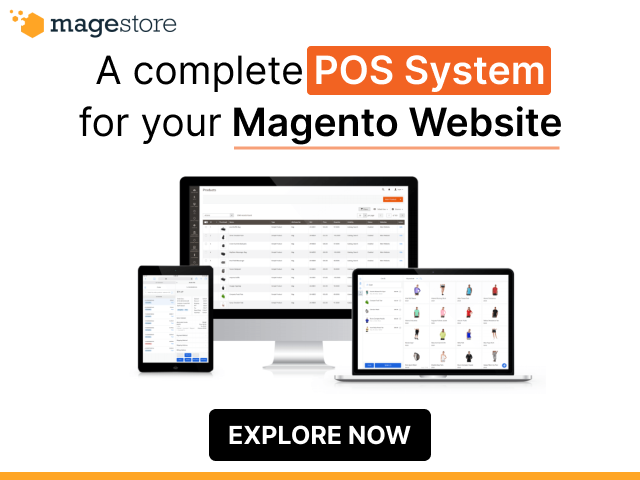Epicor products are diverse, ranging from Epicor ERP to POS, which suits different business types and sizes. Regardless of which Epicor product line you use, Magento Epicor integration yields numerous benefits by enabling data exchanges between Magento and Epicor systems. With smooth data flows, you can better manage your business, streamline many processes, and improve your business performance.
In most cases, you must employ a connector to bridge the two platforms as Epicor isn’t natively compatible with Magento. However, you’d better consider some major drawbacks of these intermediaries before using them to connect Epicor and Magento, such as high costs, unstable connections, and security risks.
To help you pick the most suitable Magento ERP integration solution, we introduce the top 5 connectors for your reference. If you intend to replace your current non-native Epicor system, we also unveil a more optimal solution at the end of this post. Stay tuned!
Why need Magento Epicor integration?
Linking Magento and Epicor automates the seamless information flow between Magento online stores, physical locations, and backend operations, which ensures data accuracy and simplifies business processes for greater efficiency and customer satisfaction.
- Control inventory across channels: Epicor Magento connection keeps product data, including descriptions, images, pricing, and updates on product details consistent across sales channels, eliminating any information conflicts that might confuse your customers. The synced data also gives you a real-time view of your stock levels from multiple online and offline shops so you can make sensible decisions involving inventory transfers or stock replenishment.
- Enhance order fulfillment: Linking Epicor and Magento transfers order and customer data between the two systems, allowing you to choose the stores for fulfillment, thus speeding up order processing and ensuring accuracy. The integration also lets you offer your customers a wide selection of omnichannel fulfillment options, from in-store pickups to home delivery, and keeps you informed of order status in real time.
- Generate comprehensive insights: Magento 2 Epicor ERP integration unifies critical business data from both online and offline sales channels like total order quantity, orders by product, orders by store, refunds, and cancellations. With these data in hand, you can extract useful insights into your business performance and take proper actions to reach your business goals.
- Deliver omnichannel shopping experience: By joining Magento and Epicor, you can enable your customers to collect loyalty points, store credits, or enjoy other omnichannel loyalty programs both online and in store. The integration also syncs customer data like contact information, purchase history, and spending habits between the two platforms, providing you with a complete picture of your customers. This allows you to develop personalized marketing offers and messages to encourage more purchases.
To get these benefits, you should find an appropriate way to connect Magento and Epicor properly. Let’s discover the most common methods to join these two systems in the next part!
3 ways to connect Magento with Epicor
To integrate Epicor to Magento 2, you can use Epicor Commerce Connect, iPaaS, or build custom integration. Let’s discover which method is the best one for your business scenario.
3rd-party integration connectors
Magento Epicor connectors are easy-to-use, straightforward, and cost-saving solutions to link the two platforms for data syncs.
- How it works: The connectors avail of the Magento and Epicor APIs to enable the data exchanges between the two platforms. They often come with pre-built workflows and business rules to move data from one system to the other.
- Pros and cons:
Pros | Cons |
|
|
Integration Platform as a Service (iPaaS)
An iPaaS is a ready-to-use integration solution that empowers you to connect Magento with Epicor with little or no technical expertise. These platforms are feature-rich, customizable, and scalable for your business expansion.
- How it works: iPaaS often comes with an intuitive user interface to help you govern and track your integrations centrally. This solution has numerous ready-built connectors, pre-made templates, business workflows, and rules to facilitate data sharing between Magento and Epicor. What’s more, it also provides users with many tools for data transformation, process automation, and error detection.
- Pros and cons:
Pros | Cons |
|
|
Custom APIs
If you have unique business needs and sufficient resources, you can choose to develop custom API integration.
- How it works: You can assign the task of building custom code to connect Epicor and Magento to your in-house technical team or a 3rd-party service provider. After understanding your business requirements, the technical team will develop a custom solution to integrate Epicor and Magento 2 using their APIs. These developers also take charge of supervising, maintaining, and fixing errors during the integration process.
- Pros and cons:
Pros | Cons |
|
|
How to choose the best solution?
You should consider the following factors to select the most suitable integration solution for your business.
- Business requirements: To opt for a fitting solution, you should clarify your specific business demands, including the data you want to sync between Magento and Epicor, the sync directions, and frequencies. You should also take into account the total order and product quantity that needs processing and your future plans to make sure the chosen method can accommodate your changing business requirements.
- Technical resources: Magento Epicor integration solutions vary in the level of technical expertise required to use, customize, and maintain. Therefore, it’s a good idea to examine your current technical resources, including your personnel, equipment, and expertise, to see whether you have enough capability to utilize a connector, an iPaaS, or build a custom API integration on your own.
- Budgets: Looking into the pricing structure of each solution and calculating the amount you’re willing to spend is pivotal. This will help you assess how the costs for integration can affect your profit in the long term and better control your business expenses to avoid any extra financial burdens. For example, an Epicor Magento extension might charge one-time or subscription-based fees with multiple pricing options. Therefore, you should check what each option offers, like how many products, orders, or tasks you can process, and whether you have to pay implementation, customization, and other fees.
4 best connectors to integrate Epicor and Magento
Connector | Key features | Pricing | Pros | Cons | Customer reviews |
DCKAP Integrator |
| DCKAP Integrator has 3 pricing plans.
|
|
| 4.7/5.0 on G2
|
Epicor Cloud ERP integration add-on for Magento 2 |
| Contact for details |
|
| 4.6/5.0 on Trustpilot
|
Alumio |
| Essential Edition: From €11,988/ year:
Growth Edition: From €20,388/ year:
Custom Edition: Custom price
|
|
| 4.5/5.0 on Capterra
|
Commercium by Constacloud |
| There are 6 pricing plans for Commercium.
|
|
| 4.3/ 5.0 on Trustpilot
|
5 tips for a seamless Epicor and Magento integration
Here are some tips you can apply to guarantee a smooth Magento ERP connection.
- Set business objectives: Having clear business goals means determining the business processes and aspects that the integration will help you improve and the expected outcomes you wish to get. By doing this, you can easily measure the integration performance against a transparent set of criteria to adjust accordingly.
- Devise data mappings and workflows: You should decide on the following factors before executing the integration.
- Data points: Determine the data you want to transfer between Magento and Epicor, such as order details, customer information, and stock levels.
- Sync directions: Whether the data flows unilaterally or bilaterally
- Sync frequencies: Whether the data syncs take place in real time, near real time, or at a specified interval
Defining these elements before linking Magento and Epicor enables you to monitor the integration easily, accelerate data transfers, and ensure system stability.
- Select a suitable integration solution: Make sure you choose a connector that has all the necessary features to meet your integration needs. Customizability, scalability, and the support policy of the middleware providers are also worth considering if you want a solution that can adapt to your evolving business requirements. Besides, remember to factor in the integrator costs before making final decisions so the expenses won’t exceed your financial capability.
- Clean data: It’s essential to remove duplicated, incorrect, and irrelevant data and standardize data formats before joining Epicor and Magento. This step helps prevent your systems from slowing down, speeds up data transfers, and ensures data consistency and accuracy for business insight extraction.
- Test and maintain: Testing the Magento 2 Epicor integration before it goes live helps you spot and tackle any potential problems that might negatively affect your overall business operations. In addition, you should allocate staff to supervise the integration to fix errors and find room for improvement.
An alternative solution to the Epicor + connector
Drawbacks of using connectors to integrate Magento and Epicor
Below are several downsides you have to face when utilizing a Magento Epicor connector.
- Unstable connection: The stability of the Magento and Epicor connection relies heavily on the performance of the middleware. If your chosen connector experiences errors, bugs, or crashes, the connection might be lost, leading to sync disruptions, data mismatch, data inaccuracy, and other severe issues.
- High costs: The prices of a connector are often subscription-based and change in line with your order, product, and store number. Adding the integrator costs and Epicor ERP or Epicor POS expenses together, you end up having to pay a huge total fee to get an ERP or POS system that can connect with Magento for data syncs.
- Multiple contact points: Employing a connector for Epicor Magento integrations increases your dependency on other parties to operate your systems, which turns out to be a great disadvantage in many cases. When a problem arises, you will need to contact both Epicor and the connector providers to find the causes and handle the errors, which might be slow, complicated, and inefficient.
- Security risks: To facilitate Magento Epicor integration via a connector, you must share your business data with the connector provider, which raises certain security concerns. Though connectors adopt varied security technologies to protect your data, there’s still a great chance that your information faces security threats like data loss, data leakages, or unauthorized access.
Benefits of using a Magento-native ERP for direct connection with Magento
- Stable connection: With a Magento-native ERP, there’s no need to use middleware for Magento Epicor integration as the two platforms can directly integrate, thus ensuring an uninterrupted connection for real-time data exchanges and minimizing errors.
- One single contact point: Using a Magento-native ERP gives you more control over your systems. Rather than reaching out to different vendors when an issue happens, you just need to contact the ERP solution provider for technical support, making the error-handling process faster and more effective.
- Low business costs: Employing a Magento-native solution saves you a considerable amount as you don’t have to spend on Epicor eCommerce integration middleware. You only need to pay for a complete ERP to have essential features to operate your business and sync data with Magento.
- Reduced security risks: Not engaging another vendor in managing your systems means you don’t have to reveal your business data to another party, thereby reducing the risks of data loss, data breaches, and other security attacks.
A Magento-native solution for direct Magento integration: No connector needed
Employing an integrator to connect the non-native Epicor system with Magento for real-time data movement drives up your operational costs and results in severe problems. To boost your business efficiency and lower expenses, you’d better switch to a Magento-native solution for direct connection with Magento.
Magestore Retail Management PWA (RMS) and Magestore Magento POS (Web POS powered by PWA technology) are native, feature-rich, and cost-effective solutions that can integrate with Magento directly to exchange data in real time. Depending on your business needs, you can choose Magestore RMS as an Epicor ERP replacement to manage all back-office tasks without access to the Magento backend.
If you’re looking for a complete solution, Magestore offers assorted modules to help you control products, inventory, orders, customers, payments, PO, order fulfillment, and reporting.

Let’s see how Magestore outperforms Epicor!
Magestore Magento POS and RMS | Epicor |
Direct integration:
| Indirect integration:
|
Straightforward for quick onboarding
| Difficult to use and require a steep learning curve
|
Reliable, strong, and stable
| Unreliable and unstable
|
Affordable costs
| High costs
|
Conclusion
Magento Epicor integration allows real-time data exchanges between Magento and Epicor ERP and POS to streamline business processes for enhanced efficiency and seamless customer experience. There are 3 main ways to integrate the two systems, including using 3rd-party connectors, iPaaS, or building a custom integration.
Though popular, integration connectors can cause several issues for your business like sync disruptions, data inaccuracy, and data loss. To avoid this, you should consider employing a Magento-native solution for a direct connection with Magento to transmit data in real time.
Magestore RMS and POS are powerful, functional, and well-performing alternatives to Epicor systems that can ensure a stable connection with Magento for data transfers and decrease your business costs in the long run.
Do your research and pick the best option for your business now! Or talk with a Magento expert will help save hours of research and effort.










